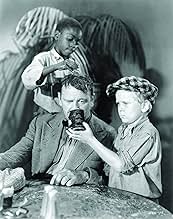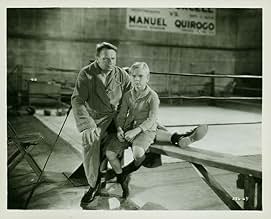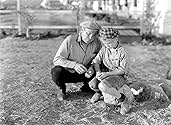An alcoholic ex-boxer struggles to provide a good living for his son.An alcoholic ex-boxer struggles to provide a good living for his son.An alcoholic ex-boxer struggles to provide a good living for his son.
- Won 2 Oscars
- 5 wins & 3 nominations total
Roscoe Ates
- Sponge
- (as Rosco Ates)
Dannie Mac Grant
- Boy Taunting Dink
- (uncredited)
Frank Hagney
- Manuel Quiroga - Mexican Champ
- (uncredited)
Dell Henderson
- The Doctor
- (uncredited)
Tom McGuire
- Los Angeles Promoter
- (uncredited)
Walter Percival
- Los Angeles Promoter
- (uncredited)
Lee Phelps
- Louie - the Bartender
- (uncredited)
Andy Shuford
- Boy at Racetrack
- (uncredited)
Dan Tobey
- Ring Announcer
- (uncredited)
Storyline
Did you know
- TriviaWallace Beery actually got one less vote than Fredric March in the 1931/1932 Academy Awards voting for best actor, but the rules at the time considered anyone with one or two votes less than the leader as being in a tie. So both got Academy Awards.
- GoofsAs Dink plays on the balcony awaiting his meeting with Linda, he steals chewing gum and candy for himself off of a table on the balcony. He then steals the contents of a box of cigarettes, saying that he'll "bring some home for the Champ", and stuffs them into his right jacket pocket. However, during the ride home, Andy reaches into Dink's right jacket pocket and finds cigars rather than the cigarettes which we clearly saw Dink steal.
- Quotes
[Dink compares the swanky home to his own]
Dink Purcell: The Champ and I ain't fixed up swell as this, but our joint's more lively.
- ConnectionsEdited into The Our Gang Story (1994)
- SoundtracksThe Monkeys Have No Tails in Pago Pago
(uncredited)
Composer uncertain
Sung a cappella by Wallace Beery
Featured review
Father/son movies were nothing new when November 1931's "The Champ" was released. But its ending is what struck movie audiences as unique, one of cinema's most potent tear jerkers ever projected on the screen. "The Champ is one of the greatest love stories ever put to film, the story of a man who wants to do right but fails and a son who never gives up on him," film reviewer Jerry Roberts writes. "(Wallace) Beery is what gives the film its foundation."
Beery performance was so powerful he won the 5th Academy Awards' Best Actor in a virtual tie with Frederic March for his role in 1931's "Dr. Jekyll and Mr. Hyde." After receiving the statuette, Berry, in the middle of renegotiating his contract with MGM, demanded he be paid one dollar more than the studio's highest paid actor. The agreement made him the richest salaried Hollywood actor at that time. Francis Marion wrote "The Champ's" screenplay especially with Beery in mind. It proved to be a great inspiration since she won the Academy Award's Best Story for her work on bringing bucketful of tears to millions of viewers.
Her tale has Andy "Champ" Purcell (Beery), a former world heavyweight title holder, down on his luck and turns to drink and gambling. Through his divorce, Andy was able to keep his son, Dink (Jackie Cooper), until his mother Linda (Irene Rich), sees him at the racetrack with his father. Remarried into wealth, Linda gets the court to gain custody of Dink. In a classic highly emotional separation scene, Andy, in prison, says goodbye to his loyal son, only to have Dink jump off the train transporting him to his mother's home. He wants to see his father fight one more match facing off against the Mexican champion in what turns out to be a brutal match. A preview audience loved the movie, except for the ending. MGM's head of production, Irving Thalberg, had the match reshot, ending with one of the most emotional 18-handkerchief scenes in cinema.
Despite the warmth displayed on the screen between the two actors, Beery and Cooper did not get along. Beery hated childhood actors, and it was evident he didn't enjoy his time with the nine-year-old Jackie. Publicly, he diplomatically described Cooper as "a great kid," but the boy claimed the actor treated him like "an unkempt dog." In retrospect, Cooper said it was pure jealousy that made Beery, in scene after scene, try to upstage him. Beery was so fed up with the director calling for tight shots of Cooper's teary face, he demanded in his new MGM contract that no juvenile actor could ever have a close-up in any picture with him. Beery vowed he would never appear in another movie with Cooper again after "The Champ" wrapped. But so popular was the acting duo that he took back his promise in the mid-1930s, sharing screen time again with Cooper in three more films.
Besides Beery's tied win, the Academy nominated "The Champ" for Best Picture as well as its director, King Vidor for Best Director. Francis Marion's award-winning script was so brilliant Red Skelton adapted it into his 1952 film, "The Clown," where he plays the Andy character as a has-been clown rather than a boxer. Later generations are more familiar with director Franco Zeffirelli's 1979 version of "The Champ" with Jon Voight, Faye Dunaway and Ricky Schroder as the son. This film was actress Joan Blondell's last movie.
Beery performance was so powerful he won the 5th Academy Awards' Best Actor in a virtual tie with Frederic March for his role in 1931's "Dr. Jekyll and Mr. Hyde." After receiving the statuette, Berry, in the middle of renegotiating his contract with MGM, demanded he be paid one dollar more than the studio's highest paid actor. The agreement made him the richest salaried Hollywood actor at that time. Francis Marion wrote "The Champ's" screenplay especially with Beery in mind. It proved to be a great inspiration since she won the Academy Award's Best Story for her work on bringing bucketful of tears to millions of viewers.
Her tale has Andy "Champ" Purcell (Beery), a former world heavyweight title holder, down on his luck and turns to drink and gambling. Through his divorce, Andy was able to keep his son, Dink (Jackie Cooper), until his mother Linda (Irene Rich), sees him at the racetrack with his father. Remarried into wealth, Linda gets the court to gain custody of Dink. In a classic highly emotional separation scene, Andy, in prison, says goodbye to his loyal son, only to have Dink jump off the train transporting him to his mother's home. He wants to see his father fight one more match facing off against the Mexican champion in what turns out to be a brutal match. A preview audience loved the movie, except for the ending. MGM's head of production, Irving Thalberg, had the match reshot, ending with one of the most emotional 18-handkerchief scenes in cinema.
Despite the warmth displayed on the screen between the two actors, Beery and Cooper did not get along. Beery hated childhood actors, and it was evident he didn't enjoy his time with the nine-year-old Jackie. Publicly, he diplomatically described Cooper as "a great kid," but the boy claimed the actor treated him like "an unkempt dog." In retrospect, Cooper said it was pure jealousy that made Beery, in scene after scene, try to upstage him. Beery was so fed up with the director calling for tight shots of Cooper's teary face, he demanded in his new MGM contract that no juvenile actor could ever have a close-up in any picture with him. Beery vowed he would never appear in another movie with Cooper again after "The Champ" wrapped. But so popular was the acting duo that he took back his promise in the mid-1930s, sharing screen time again with Cooper in three more films.
Besides Beery's tied win, the Academy nominated "The Champ" for Best Picture as well as its director, King Vidor for Best Director. Francis Marion's award-winning script was so brilliant Red Skelton adapted it into his 1952 film, "The Clown," where he plays the Andy character as a has-been clown rather than a boxer. Later generations are more familiar with director Franco Zeffirelli's 1979 version of "The Champ" with Jon Voight, Faye Dunaway and Ricky Schroder as the son. This film was actress Joan Blondell's last movie.
- springfieldrental
- Oct 14, 2022
- Permalink
- How long is The Champ?Powered by Alexa
Details
- Runtime1 hour 26 minutes
- Color
- Aspect ratio
- 1.20 : 1
Contribute to this page
Suggest an edit or add missing content






































